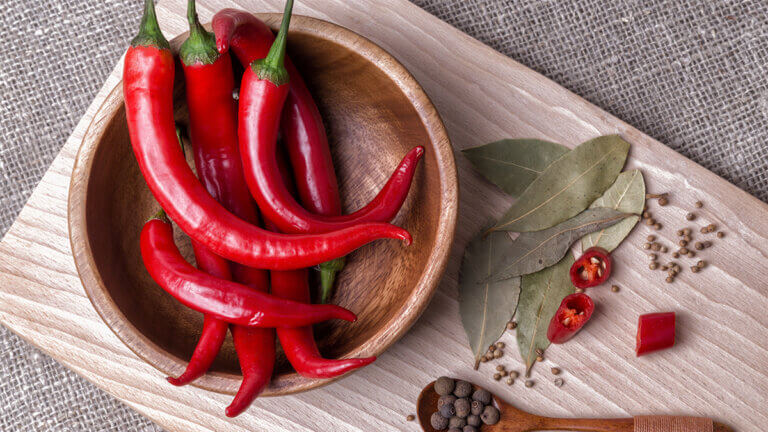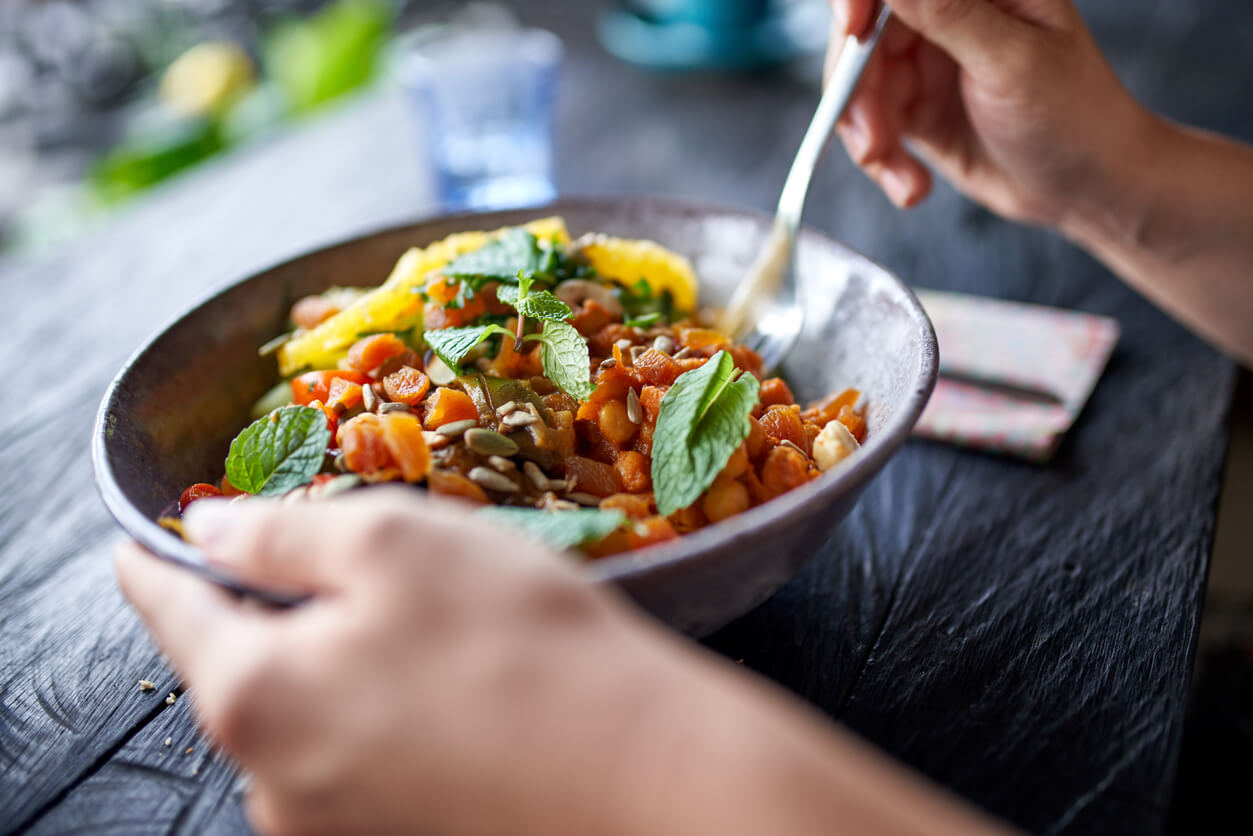Is It Safe to Eat Spicy Food During Pregnancy?


Written and verified by the nutritionist Saúl Sánchez Arias
Eating spicy food can be quite beneficial for your health. However, it’s not recommended during all stages of life, or at least not in all contexts. There are situations in which the ingestion of foods with this flavor is discouraged because of their irritating capacity. Therefore, today we’re going to tell you if you can or can’t eat spicy food during pregnancy. Before starting, it’s important to point out that the diet during pregnancy must be optimized in order to ensure the correct development of the fetus. It’s important to achieve an optimal nutritional intake, as a deficit of essential nutrients could produce malformations and have a negative impact on the baby’s health.
The benefits of spicy food
Spicy flavors are usually produced by a substance called capsaicin. This element has been shown to be capable of activating the metabolism and therefore promoting weight loss. In addition, it produces a slight increase in body temperature, which results in a more efficient mobilization and oxidation of lipids (fats). For this reason, it’s often included in the context of weight-loss diets. Capsaicin also helps control inflammation, as evidenced by research published in the European Journal of Pharmacology. You should keep in mind that this mechanism is responsible for the development of many complex diseases throughout life. Therefore, it should be controlled in order to be efficient, but not over-promoted. In the context of sports, this substance is often used topically in some creams with the aim of producing an analgesic effect at a muscular level. In fact, its oral consumption could contribute to reducing joint pain, which is also beneficial for pregnant women.

Is hot pepper recommended during pregnancy?
The truth is that there’s no scientific article that advises against hot pepper in pregnancy due to risks for the mother or the baby. Its consumption is safe during the entire stage of gestation. It may even be especially recommended to control inflammation levels and ensure homeostasis. The only contraindication is that spicy food has a certain irritant capacity. For this reason, if a pregnant woman has started to develop digestive symptoms due to this condition, it may not be the best alternative. The burning, reflux, or even diarrhea, if any, could become more intense. Nor should this flavor be included in the diet in large quantities if there are inflammatory diseases of intestinal type, regardless of the gestation process. In these cases, you could experience an increase in discomfort.
Beware of hot sauces!
Although spicy is good for health and can be consumed during pregnancy, be careful with certain types of hot sauces, especially industrial ones. Sometimes, these products contain additives or trans fats. Both elements could be harmful to health if consumed on a recurrent basis. Trans fats are of particular concern. These compounds increase the incidence of complex diseases such as diabetes, as they produce greater inflammation in the internal environment. They’re not recommended at any stage of life and even less during pregnancy. During pregnancy, it’s best to prioritize the consumption of fresh foods with high nutritional density, seeking the maximum optimization of physiology.

You can eat spicy food during pregnancy
As you’ve seen, you can eat spicy food during pregnancy without any problem. It won’t be dangerous for the health of the mother or the fetus. You’ll only need to restrict its presence in your diet in the case of intestinal or digestive discomfort, or if any inflammatory intestinal disease has been developed. Finally, keep in mind that, during pregnancy, it becomes crucial to promote healthy lifestyle habits. The mother’s routines during this stage condition the baby’s health in the future. It’s also usually necessary to include in the diet certain supplements to avoid deficits and, therefore, certain malformations. For example, folic acid.
Eating spicy food can be quite beneficial for your health. However, it’s not recommended during all stages of life, or at least not in all contexts. There are situations in which the ingestion of foods with this flavor is discouraged because of their irritating capacity. Therefore, today we’re going to tell you if you can or can’t eat spicy food during pregnancy. Before starting, it’s important to point out that the diet during pregnancy must be optimized in order to ensure the correct development of the fetus. It’s important to achieve an optimal nutritional intake, as a deficit of essential nutrients could produce malformations and have a negative impact on the baby’s health.
The benefits of spicy food
Spicy flavors are usually produced by a substance called capsaicin. This element has been shown to be capable of activating the metabolism and therefore promoting weight loss. In addition, it produces a slight increase in body temperature, which results in a more efficient mobilization and oxidation of lipids (fats). For this reason, it’s often included in the context of weight-loss diets. Capsaicin also helps control inflammation, as evidenced by research published in the European Journal of Pharmacology. You should keep in mind that this mechanism is responsible for the development of many complex diseases throughout life. Therefore, it should be controlled in order to be efficient, but not over-promoted. In the context of sports, this substance is often used topically in some creams with the aim of producing an analgesic effect at a muscular level. In fact, its oral consumption could contribute to reducing joint pain, which is also beneficial for pregnant women.

Is hot pepper recommended during pregnancy?
The truth is that there’s no scientific article that advises against hot pepper in pregnancy due to risks for the mother or the baby. Its consumption is safe during the entire stage of gestation. It may even be especially recommended to control inflammation levels and ensure homeostasis. The only contraindication is that spicy food has a certain irritant capacity. For this reason, if a pregnant woman has started to develop digestive symptoms due to this condition, it may not be the best alternative. The burning, reflux, or even diarrhea, if any, could become more intense. Nor should this flavor be included in the diet in large quantities if there are inflammatory diseases of intestinal type, regardless of the gestation process. In these cases, you could experience an increase in discomfort.
Beware of hot sauces!
Although spicy is good for health and can be consumed during pregnancy, be careful with certain types of hot sauces, especially industrial ones. Sometimes, these products contain additives or trans fats. Both elements could be harmful to health if consumed on a recurrent basis. Trans fats are of particular concern. These compounds increase the incidence of complex diseases such as diabetes, as they produce greater inflammation in the internal environment. They’re not recommended at any stage of life and even less during pregnancy. During pregnancy, it’s best to prioritize the consumption of fresh foods with high nutritional density, seeking the maximum optimization of physiology.

You can eat spicy food during pregnancy
As you’ve seen, you can eat spicy food during pregnancy without any problem. It won’t be dangerous for the health of the mother or the fetus. You’ll only need to restrict its presence in your diet in the case of intestinal or digestive discomfort, or if any inflammatory intestinal disease has been developed. Finally, keep in mind that, during pregnancy, it becomes crucial to promote healthy lifestyle habits. The mother’s routines during this stage condition the baby’s health in the future. It’s also usually necessary to include in the diet certain supplements to avoid deficits and, therefore, certain malformations. For example, folic acid.
All cited sources were thoroughly reviewed by our team to ensure their quality, reliability, currency, and validity. The bibliography of this article was considered reliable and of academic or scientific accuracy.
- Varghese, S., Kubatka, P., Rodrigo, L., Gazdikova, K., Caprnda, M., Fedotova, J., Zulli, A., Kruzliak, P., & Büsselberg, D. (2017). Chili pepper as a body weight-loss food. International journal of food sciences and nutrition, 68(4), 392–401. https://doi.org/10.1080/09637486.2016.1258044
- Braga Ferreira, L. G., Faria, J. V., Dos Santos, J., & Faria, R. X. (2020). Capsaicin: TRPV1-independent mechanisms and novel therapeutic possibilities. European journal of pharmacology, 887, 173356. https://doi.org/10.1016/j.ejphar.2020.173356
This text is provided for informational purposes only and does not replace consultation with a professional. If in doubt, consult your specialist.








